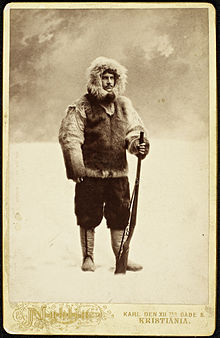Eivind Astrup
| Eivind Astrup | |
|---|---|

Astrup c. 1893
|
|
| Born |
17 September 1871 Christiania, Norway |
| Died | 27 December 1895 (aged 24) Folldal, Norway |
| Burial place | Vår Frelsers gravlund, Oslo |
| Nationality | Norwegian |
| Occupation | Arctic Explorer |
| Works | Blandt Nordpolens naboer |
| Parent(s) | Harald Astrup |
| Relatives |
Henning Astrup (brother) Thorvald Astrup (brother) Sigurd Astrup (brother) Peter Andreas Morell (brother-in-law) |
| Awards |
Order of St. Olav Murchison Award |
Eivind Astrup (/ʼæɪʋɪn ˈɑstɾʉp/; 17 September 1871 – 27 December 1895) was a Norwegian explorer and writer. Astrup participated in Robert Peary's expedition to Greenland in 1891–92 and mapped northern Greenland. In the follow-up Greenland expedition by Peary during 1893–94 he explored and mapped Melville Bay on the north-west coast of Greenland. Among his works is Blandt Nordpolens Naboer from 1895 (English edition With Peary near the Pole, 1898). He was awarded the Knight of the Order of St. Olav in 1892.
Astrup is credited for introducing the combination of dog sleds and skis, which came to revolutionize polar expeditions.
Eivind Astrup was the son of merchant Harald Astrup (1831–1914) and Emilie Johanne Smith (1836–1915), and brother of architect Henning Astrup (1864–1896), architect Thorvald Astrup (1876–1940), and wholesaler and politician, Sigurd Astrup (1873–1949).
In 1889 Astrup undertook a trade examination in Christiania and then travelled to Philadelphia for further study. The adventurous youngster had dreamed about exploring in Africa, but after he saw a newspaper article stating that Robert Peary planned an expedition to northern Greenland, he contacted Peary and was given a place on the expedition.
During Peary's expedition in 1891–92 Astrup made friends with the local Inuit from whom he learned about survival techniques in the extreme polar environment.
Astrup accompanied Peary on a sleigh ride from their winter quarters in Inglefield Gulf and over north-western Greenland ice to Navy Cliff at Independence Fjord. They traversed more than 2,000 km, four times as far as Fridtjof Nansen had gone during his exploration of more southerly parts of Greenland four years earlier. Peary and Astrup were the first to explore and map the north-western areas of Greenland and were the first to come to the view that Greenland is an island. The trip had insufficient rations, but a successful hunt for musk ox saved them.
...
Wikipedia
